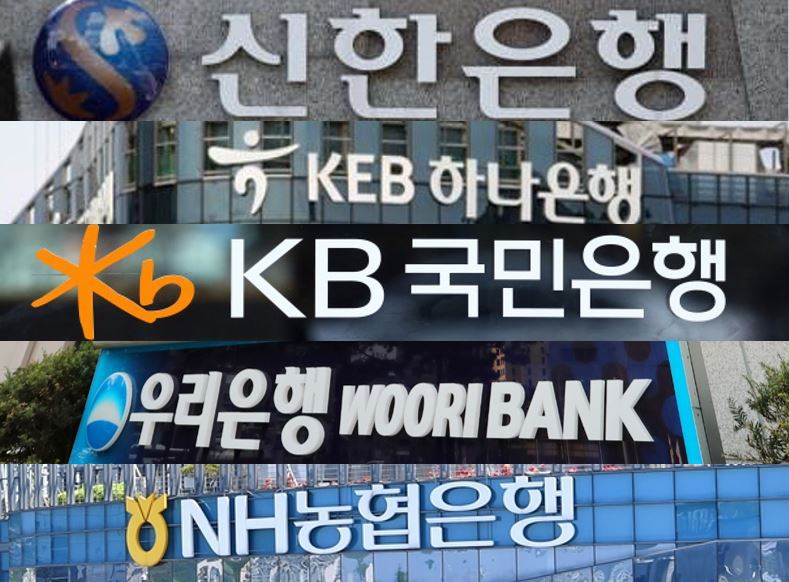[KH Explains] Bank stocks falter amid windfall tax proposal
As banks face pressure to give back to society, some experts warn foreign investors could view govt. regulation as inconsistent
By Song Seung-hyunPublished : Nov. 23, 2023 - 13:32

A longstanding Korean market adage that "when the cold wind blows, it's time to invest in bank stocks" appears to have lost its luster, as those shares have struggled due to a proposed windfall tax on local lenders' profits from high interest rates.
The adage stems from the historical tendency for bank stocks to rise in the fourth quarter, coinciding with the distribution of year-end dividends.
This year, the prospect of hefty taxes is moderating dividend forecasts, causing hesitation to snap up those stocks.
On Nov. 10, the main opposition Democratic Party of Korea unveiled plans to introduce a windfall tax on banks that have profited from recent interest rate hikes.
A windfall tax is a levy imposed by a government on companies that have benefited unusually from something they were not responsible for, in this case, the gains from higher interest rates.
Under the proposal, banks would be required to contribute up to 40 percent of their net interest profit that exceeds 120 percent of their average net interest profit over the past five years to a special fund in the form of a "contribution." This money would be used to support programs that promote mutual growth with vulnerable groups, including low-income earners and people with disabilities or older adults.
"The UK, Spain, Italy and the US have introduced or are seeking to introduce windfall taxes," said Rep. Kim Sung-ju of the Democratic Party during a party meeting at the National Assembly in Yeouido, Seoul on Nov. 16.
"Korea also needs to lay the groundwork for financial companies to return their excess profits back to society," he added.
Financial Supervisory Service Governor Lee Bok-hyun denounced the main opposition party's proposal as "gutting a (golden) goose," while other FSS and Financial Services Commission officials called it "populism."
"The proposal lacks an understanding of the individual financial institution's situation and seeks only to extract profit, posing a potential threat to the foundational stability of the financial industry," Lee said.
However, the same financial authorities have urged lenders to provide benefits voluntarily, such as interest reductions, amounting to around 1.9 trillion won ($1.46 billion) -- the same amount that the windfall tax is expected to collect from banks.
In response, eight local financial groups -- NH NongHyup, Shinhan, Woori, Hana, KB, BNK, JB, and DGB -- pledged to come up with a concrete vision to increase profit sharing by the end of the year.
In other words, local banks are now faced with pressure to contribute to society, either through taxes or voluntary measures.
The impact of the windfall tax proposal on bank stocks is already noticeable. As of Nov. 21, the Korea Exchange Bank Index rose only 0.35 percent in the past month, compared to the Kospi index's 3.9 percent increase.
Globally, Korean banks are not the first to face a stock price fall due to a windfall tax proposal.
For instance, in August, the Italian government proposed a similar windfall tax on banks, causing the Italian banking stock index to fall 7.3 percent and the European bank index to fall 3.7 percent. Following the proposal, the European Central Bank recommended Italy withdraw the tax proposal.
This led the Italian government to shift its approach to requiring banks to build up reserves equal to 2.5 times the amount of windfall tax they would have to pay.
Professor Suk Byeong-hoon from Ewha Womans University's department of economics, who opposes the tax, argues that it is problematic for politicians and financial authorities to regard the profits that banks have gained through risk management as windfall profits.
"If windfall taxes are imposed on banks that have made a lot of profit, banks may lose their incentive to manage risk rigorously in order to maximize profits," he said.
He said that banks this year carefully evaluated the creditworthiness of financial consumers to maximize profit and this effort should not be overlooked.
Suk highlighted that, as of August, the non-performing loan ratio for corporate loans at domestic banks was 0.47 percent and the NPL ratio for household loans was 0.38 percent. These figures are lower than the average NPL ratios in the decade before COVID-19.
For the period from 2009 to 2019, the average NPL ratio for corporate loans was 0.89 percent, and the average NPL ratio for household loans of 0.48 percent.
Foreign investors echo these concerns, evident in their recent actions.
According to Hana Securities, foreign investors bought a net of 859 billion won worth of the Kospi last week but sold a net 117 billion won worth of bank stocks. This situation is interpreted as being due to concerns that earnings per share will decline sharply if a windfall tax is applied.
"Among financial groups, there are growing concerns that foreign investment could decline further," an industry official said on the condition of anonymity.
He added that government flip-flopping -- it had urged banks to raise interest rates to reduce household debt in October and is now pressuring them to lower interest rates -- can give the impression of a lack of policy consistency.
Hana Financial Investment researcher Choi Jeong-wook said, "Regardless of the size of the proposed tax, the fact that regulatory concerns are continuing to be highlighted is bound to cause negative sentiment for bank stocks."
According to FSS data, the annual net interest profit of domestic banks averaged 42.5 trillion won from 2018 to 2022. The figure for the initial six months of the current year indicates a total of 28.5 trillion won, projecting an estimated annual figure of approximately 57 trillion won.



















![[Today’s K-pop] Treasure to publish magazine for debut anniversary](http://res.heraldm.com/phpwas/restmb_idxmake.php?idx=642&simg=/content/image/2024/07/26/20240726050551_0.jpg&u=)